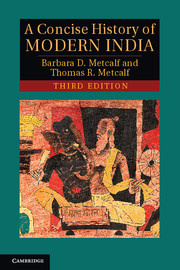Book contents
- Frontmatter
- Contents
- Illustrations
- Preface to the third edition
- Preface to the first edition
- Glossary
- Chronology
- 1 Sultans, Mughals, and Pre-Colonial Indian Society
- 2 Mughal Twilight: The Emergence of Regional States and the East India Company
- 3 The East India Company Raj, 1772–1850
- 4 Revolt, the Modern State, and Colonized Subjects, 1848–1885
- 5 Civil Society, Colonial Constraints, 1885–1919
- 6 The Crisis of the Colonial Order, 1919–1939
- 7 The 1940s: Triumph and Tragedy
- 8 Congress Raj: Democracy and Development, 1950–1989
- 9 Democratic India at the Turn of the Millennium: Prosperity, Poverty, Power
- Biographical notes
- Bibliographic essay
- Index
Preface to the third edition
Published online by Cambridge University Press: 05 November 2012
- Frontmatter
- Contents
- Illustrations
- Preface to the third edition
- Preface to the first edition
- Glossary
- Chronology
- 1 Sultans, Mughals, and Pre-Colonial Indian Society
- 2 Mughal Twilight: The Emergence of Regional States and the East India Company
- 3 The East India Company Raj, 1772–1850
- 4 Revolt, the Modern State, and Colonized Subjects, 1848–1885
- 5 Civil Society, Colonial Constraints, 1885–1919
- 6 The Crisis of the Colonial Order, 1919–1939
- 7 The 1940s: Triumph and Tragedy
- 8 Congress Raj: Democracy and Development, 1950–1989
- 9 Democratic India at the Turn of the Millennium: Prosperity, Poverty, Power
- Biographical notes
- Bibliographic essay
- Index
Summary
The first edition of A Concise History of India appeared in 2001, and covered events up to the end of the twentieth century in 2000. A second edition, titled A Concise History of Modern India, to more accurately reflect its coverage, appeared in 2006. That edition took the story of India up to 2005 and included the displacement of the BJP government by the Congress under Manmohan Singh the previous year. We are immensely grateful for the enthusiastic response this book has received over the last ten years from teachers, colleagues, and students. Although not meant as a textbook, to our pleasant surprise, A Concise History of Modern India has been widely adopted in college and university courses on South Asia.
The current third edition has left intact the material in Chapters 1 through 8, up to 1989. We revised these chapters extensively for the second edition, incorporating new perspectives and new research into our narrative. Even though a number of important studies have appeared over the last several years covering the colonial and early national periods, not to mention the eighteenth century, we did not consider revision necessary at this point. Chapter 9, however, and the Epilogue, had become seriously outdated and, to be useful, required a comprehensive revision amounting to a complete reorganization. The current Chapter 9 covers the twenty-year period from 1990 to 2010 as one continuous narrative. An attempt has been made, furthermore, to reorganize the chapter in a thematic rather than wholly chronological fashion. Its two major sections assess successively the changing nature of India's politics, with special attention given to the rise of Hindu nationalism, and the growth and consequences of economic liberalization over the twenty years since the coming into office in 1991 of the Narasimha Rao government. We reflect in particular on a troubling economic polarization, with growing affluence in the cities but profound disadvantage for others. Among the most depressed are the largely tribal populations of interior central and eastern India, where there has been endemic violence in recent years. The chapter concludes with a look at the fascinating question of the rivalry between India and China, the two Asian ‘giants’, as the locus of global economic power shifts eastward. In this section we have relied substantially on the writing of such experts as the distinguished economist Amartya Sen.
Information
- Type
- Chapter
- Information
- A Concise History of Modern India , pp. xiii - xivPublisher: Cambridge University PressPrint publication year: 2012
